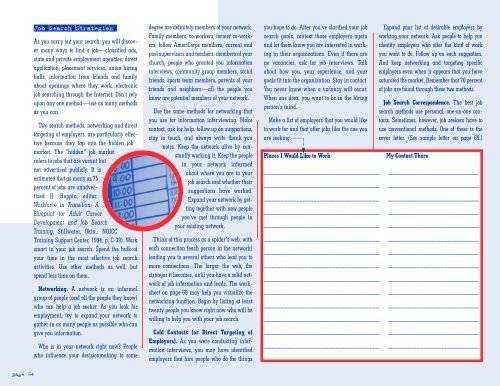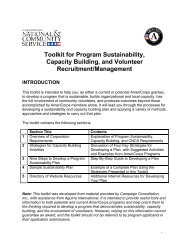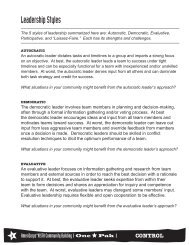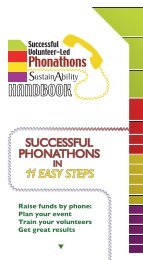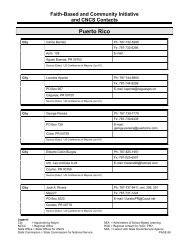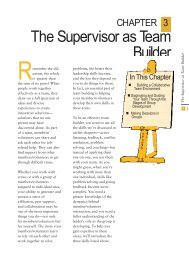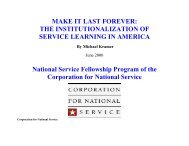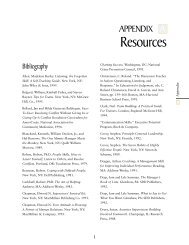Next Steps: Life After Americorps - National Service Knowledge ...
Next Steps: Life After Americorps - National Service Knowledge ...
Next Steps: Life After Americorps - National Service Knowledge ...
You also want an ePaper? Increase the reach of your titles
YUMPU automatically turns print PDFs into web optimized ePapers that Google loves.
page 64<br />
Job Search Strategies<br />
As you carry out your search, you will discover<br />
many ways to find a job—classified ads,<br />
state and private employment agencies, direct<br />
application, placement services, union hiring<br />
halls, information from friends and family<br />
about openings where they work, electronic<br />
job searching through the Internet. Don’t rely<br />
upon any one method—use as many methods<br />
as you can.<br />
Two search methods, networking and direct<br />
targeting of employers, are particularly effective<br />
because they tap into the hidden job<br />
market. The “hidden” job market<br />
refers to jobs that are vacant but<br />
not advertised publicly. It is<br />
estimated that as many as 75<br />
percent of jobs are unadvertised<br />
(J. Hoppin, editor.<br />
Workforce in Transition: A<br />
Blueprint for Adult Career<br />
Development and Job Search<br />
Training. Stillwater, Okla.: NOICC<br />
Training Support Center, 1994, p. C-39). Work<br />
smart in your job search. Spend the bulk of<br />
your time in the most effective job search<br />
activities. Use other methods as well, but<br />
spend less time on them.<br />
Networking. A network is an informal<br />
group of people (and all the people they know)<br />
who can help a job seeker. As you look for<br />
employment, try to expand your network to<br />
gather in as many people as possible who can<br />
give you information.<br />
Who is in your network right now? People<br />
who influence your decisionmaking to some<br />
degree are definitely members of your network.<br />
Family members, co-workers, former co-workers,<br />
fellow AmeriCorps members, current and<br />
past supervisors and teachers, members of your<br />
church, people who granted you information<br />
interviews, community group members, social<br />
friends, sports team members, parents of your<br />
friends and neighbors—all the people you<br />
know are potential members of your network.<br />
Use the same methods for networking that<br />
you use for information interviewing. Make<br />
contact, ask for help, follow up on suggestions,<br />
stay in touch, and always write thank you<br />
notes. Keep the network alive by constantly<br />
working it. Keep the people<br />
in your network informed<br />
about where you are in your<br />
job search and whether their<br />
suggestions have worked.<br />
Expand your network by getting<br />
together with new people<br />
you’ve met through people in<br />
your existing network.<br />
Think of this process as a spider’s web, with<br />
each connection (each person in the network)<br />
leading you to several others who lead you to<br />
more connections. The larger the web, the<br />
stronger it becomes, until you have a solid network<br />
of job information and leads. The worksheet<br />
on page 68 may help you visualize the<br />
networking function. Begin by listing at least<br />
twenty people you know right now who will be<br />
willing to help you with your job search.<br />
Cold Contacts (or Direct Targeting of<br />
Employers). As you were conducting information<br />
interviews, you may have identified<br />
employers that hire people who do the things<br />
you hope to do. <strong>After</strong> you’ve clarified your job Expand your list of desirable employers by<br />
search goals, contact those employers again working your network. Ask people to help you<br />
and let them know you are interested in work- identify employers who offer the kind of work<br />
ing in their organizations. Even if there are you want to do. Follow up on each suggestion.<br />
no vacancies, ask for job interviews. Talk And keep networking and targeting specific<br />
about how you, your experience, and your employers even when it appears that you have<br />
goals fit into the organization. Stay in contact. saturated the market. Remember that 70 percent<br />
You never know when a vacancy will occur. of jobs are found through these two methods.<br />
When one does, you want to be in the hiring<br />
person’s mind.<br />
Job Search Correspondence. The best job<br />
search methods use personal, one-on-one con-<br />
Make a list of employers that you would like tacts. Sometimes, however, job seekers have to<br />
to work for and that offer jobs like the one you use conventional methods. One of these is the<br />
are seeking. cover letter. (See sample letter on page 69.)<br />
Places I Would Like to Work My Contact There<br />
______________________________________ ______________________________<br />
______________________________________ ______________________________<br />
______________________________________ ______________________________<br />
______________________________________ ______________________________<br />
______________________________________ ______________________________<br />
______________________________________ ______________________________<br />
______________________________________ ______________________________<br />
______________________________________ ______________________________<br />
______________________________________ ______________________________<br />
______________________________________ ______________________________<br />
______________________________________ ______________________________<br />
______________________________________ ______________________________<br />
______________________________________ ______________________________<br />
______________________________________ ______________________________


